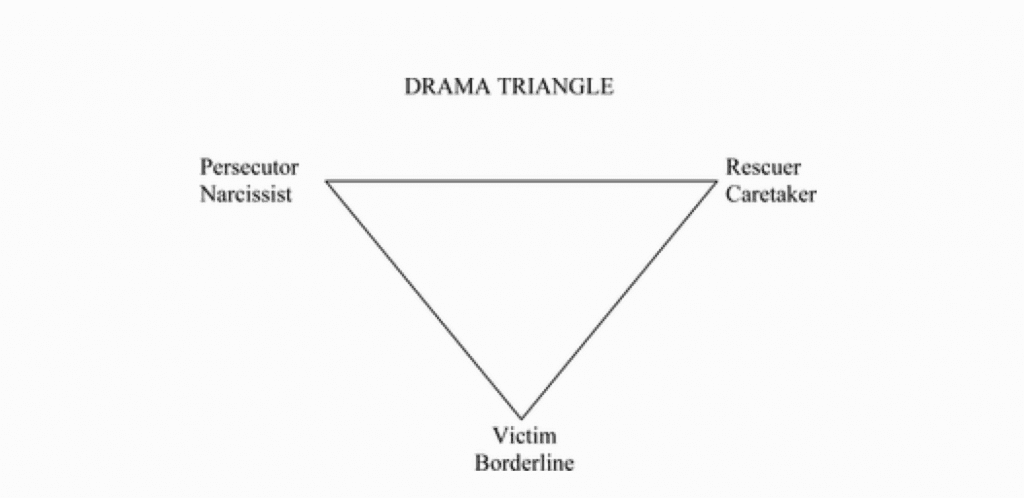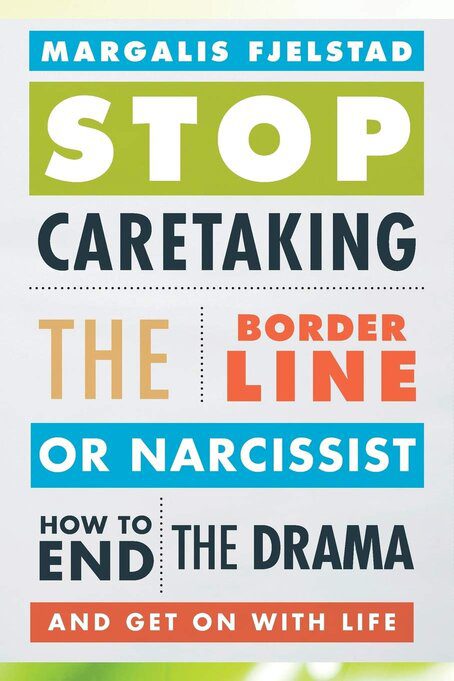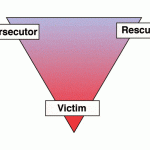In order to move through the stages from Caretaker to self-care, you need to know what you think, how you feel, what you want, and how you want to live your life.
Marriage and Family Therapist Margalis Fjelstad profers strategies for dealing and living with people with Borderline or Narcissist Personality Disorders. In Stop Caretaking the Borderline or Narcissist: How to End the Drama and Get On with Life, Margalis shares tools for breaking the cycle of drama and ways for developing a new path of personal freedom, discovery, and self-awareness.
The book looks at how someone can move from being a caring person to being a Caretaker and the effects of that role. Factors that contribute to these more extreme reactions, how they impact your life as a Caretaker, how Caretakers are set up for failure, how to get out of the Caretaker role, and how to become that loving, caring person you want to be.
Unhealthy Relationship
Being in a relationship with a borderline/narcissist can be intoxicating, full of spontaneity, exciting, and thrilling. You may feel deeply needed and super important to him or her. At the same time, this life is all about them and none about you. You may have even lost sight of who you are and what you want, and your own interests, feelings, and needs. You may have even lost friends and family connections because of the borderline/narcissist.
A healthy relationship is one that nurtures and reflects both partners. It fulfills the needs of both people—and it attends to the goals and interests and desires of both people. It is not always on high alert. Decisions in healthy relationships are made calmly after a discussion of both people’s needs and wants and people follow through with what they say they are going to do. A healthy relationship gives you energy, helps you feel relaxed, and makes you feel wanted and comfortable just the way you already are.
Personality Disorder
Personality is considered to be the pattern of behaviors, motivations, thoughts, ways of speaking, sense of self, individual quirkiness, and so on that is unique to a specific person.
Because of a biological sensitivity to emotional stress, some people do not process information about the world in such an orderly fashion. They tend to have a “highly sensitive” emotional system that reacts instantaneously and intensely to their experiences. They do not adjust to change very well or very quickly.
BORDERLINE PERSONALITY DISORDER (BPD)
BPD is described by the Diagnostic and Statistical Manual of Mental Disorders (4th ed.) (DSM-IV) as a “pervasive pattern of instability of interpersonal relationships, self-image and affects or moods, and marked impulsivity, beginning by early adulthood and present in a variety of contexts.
NARCISSISTIC PERSONALITY DISORDER (NPD)
Narcissists are people with two different self-esteems. There is a false sense of self (i.e., a pretend self that is extremely positive and desirable) and the hidden real self underneath the facade that is fearful and anxious.
HOW BORDERLINES AND NARCISSISTS ARE ALIKE AND DIFFERENT
Despite the differences in these two external personality patterns, borderlines and narcissists share a similar internal sense of low self-esteem, fear, anxiety,paranoia, and deep emotional pain from a sense of “not feeling good enough.” Both will also go to extremes to protect their emotional vulnerability.
Most important, both use many of the same defense mechanisms: blaming, projection, devaluing, idealization, splitting, denial, distortion, rationalization, and passive-aggressiveness. Narcissists also use omnipotence, whereas borderlines will use acting out. Sometimes these defense mechanisms can reach delusional or psychotic levels.
CARETAKER PERSONALITY
People who become Caretakers for a BP/NP also seem to have a certain set of personality traits. These traits do not constitute a “personality disorder.” In fact, they can be highly valued and useful to relationships and families, at work, and socially, especially when they are at moderate levels. They include a desire to do a good job, enjoyment in pleasing others, a desire to care for others, peacemaking, a gentle and mild temperament, and calm and reasonable behaviors.
What is common to all Caretakers, however, is a high level of needing to care for others, a willingness to let go of any and all of your own needs, an amazing adaptability, great skill in soothing and calming other people, a lot of internal guilt, high levels of responsibility, and a great dislike of conflict.
Splitting
Splitting is a defense mechanism that divides the world—all events, people, and feelings—into either good or bad. In order to feel okay, BP/NPs work hard to keep hold of all the good feelings. They identify with the good feelings. Whenever they have bad feelings, BP/NPs become intensely frightened and fear being overwhelmed by them. So BP/NPs place all the blame and responsibility for those bad feelings on someone/something outside themselves as a way to get rid of those feelings. The BP/NP needs the Caretaker to carry these bad feelings and be responsible for them.
THE DRAMA TRIANGLE
Stephen Karpman designed the Drama Triangle to outline the way these dysfunctional relationship patterns fit into actual roles. The roles of persecutor, rescuer, and victim appear consistently in drama-dominated, unequal relationships and keep those relationships from maturing and functioning in a healthy, happy, relaxed way. The borderline, narcissist, and Caretaker typically get locked into these three rigid and self-rewarding/self-punishing roles as their only choices.
- The persecutor has the attitude of “It’s all your fault.” This role includes blaming, criticizing, anger, rigid demands, rules, and expectations, all aimed at the victim.
- The victim carries the stance of “Poor me.” The person in this role feels hopeless, powerless, overwhelmed, and helpless. The victim refuses to make decisions, take action, or solve problems and remains clueless to what is happening and how to fix it. Thus, the victim never has to take responsibility for anything.
- The rescuer has the job to “help,” whether he or she actually wants to or not. It is a demand, fueled by external and internal guilt, that almost “forces” you to take care of protecting anyone who acts like a victim.

Protesting Colluder
You may never have been a Caretaker in other relationships, but you find yourself feeling guilty and responsible for this partner. Your high level of loyalty and logic keep you determined to work on this relationship until you get it right.
Pathological Altruism
No matter how hard you try in this relationship, you often feel disappointed, depressed, and unappreciated. Although you would like to be treated better, you ignore or reject help, compliments, and kindness from others, preferring to do things yourself. You often feel depressed.
Caretaking vs CoDependency
Codependency seems to be a more pervasive set of personality traits that are applied in every aspect of a person’s life, including at work, in friendships, at school, in parenting, and in intimate relationships. Codependent behaviors could be described quite similarly to those that Caretakers use. However, most Caretakers take on this role almost exclusively inside the family and primarily only with the borderline or narcissist.
Often Caretakers are very independent, good decision makers, competent, and capable on their own when not in a relationship with a borderline or narcissist. It is almost as if the Caretaker lives in two different worlds with two different sets of behaviors, rules, and expectations, one set with the BP/NP and another with everyone else. You may even hide your caretaking behaviors from others and try to protect other family members from taking on caretaking behavior, much like child abuse victims try to protect siblings from being abused.
FOG – Fear, Obligation and Guilt
The Caretaker role is created by a combination of highly sympathetic and parasympathetic responses, a personality guided primarily by a particular combination of feelings (fear, obligation, and guilt) as well as random and calculated reinforcement by the BP/NP, and a chaotic environment that needs organization to function to meet the basic physical and financial needs of the family.
Delusions
A delusion is a strongly and adamantly held belief that has no basis in fact or is even contrary to fact. BP/NPs use a lot of internally created, delusional explanations for how they came to feel so terrible. To them, their feelings are the actual truth of reality despite any facts to the contrary. If they feel a certain way, BP/NPs will assume that someone or something outside of themselves made them feel that way.
Illogical Thinking
You hang onto the delusional belief that if you could just find the “right way” to explain things, then the BP/NP would see things clearly and the relationship could be healed. Actually, BP/NPs seem to have a random mix of logical and illogical thoughts, which can lead you to think that you have reason for hope. The truth is that the BP/NP is unable to consistently respond logically. You may find it hard to believe that this ability just comes and goes in a random manner. However, that is exactly the reality of dealing with a BP/NP. So when you get so caught up trying to be logical, you are trapping yourself in the Caretaker role.
Enmeshment
Enmeshment results when you and the BP/NP merge into one, and it is exemplified by behaviors such as talking for each other, assuming that both of you think the same about everything, expecting to react or feel exactly the same in a situation, lack of privacy, assuming that everything that belongs to one belongs to the other, and always using “we” instead of “I” (e.g., “we think” and “we feel”). Enmeshment happens to some extent in most long-term relationships, but it is extreme in the relationship with the BP/NP.
Caretaker Involvement Levels
SELF-DEFEATERS
Self-defeating Caretakers consistently select relationships that are rejecting and humiliating.
If you are a self-defeating Caretaker, you may find yourself drawn over and over to situations and relationships where you find yourself disappointed, mistreated, unappreciated, or humiliated. Perhaps you consistently get into relationships where you are made fun of, your partner cheats on you, or your partner is already married, keeps breaking up with you, or tells you that he or she doesn’t love you or doesn’t find you attractive. Yet you continue to pursue the relationship.
PATHOLOGICAL ALTRUISM
At this level, you find joy in giving to others. You like making others feel happy. You often surprise others with thoughtful gifts and doing favors. However, you may find it uncomfortable and a little embarrassing when others do the same for you. You don’t know how to accept thanks, or you may brush off gratitude or blush when others are appreciative. It may take you quite awhile before you notice that your needs, wants, and feelings are not paid much attention by the BP/NP. He or she doesn’t seem to notice when you are tired or need a kind word or a neck rub like you would do for him or her. You may begin to feel that you are being taken for granted and unappreciated.
PROTESTING COLLUDERS
In the middle of the continuum are the Caretakers who may never have been a Caretaker in other relationships. You may find yourself stuck in the relationship with the BP/NP because you are a good-hearted person, caring, understanding, and rather confused by the strange behavior of the BP/NP. You have a strong tendency to feel sorry for the borderline’s pain or lured into the excitement and fun that the narcissist offers early in the relationship.
SELF-PROTECTORS
Self-protecting Caretakers have learned to step away from the drama with the BP/NP. You set limits and refuse to interact with the BP/NP when he or she is being manipulative and demanding. By thinking ahead, you plan your interactions with the BP/NP to avoid falling into the persecutor/victim/rescuer game. You work consistently to be aware of your own thoughts, needs, and beliefs in order to maintain a separate sense of yourself. However, all of this awareness takes a lot of planning and energy.
CUTOFFS
People who fall into this category may still be afraid of falling into the Caretaker role and adamantly refuse to give into that behavior. You may have been stuck in the Drama Triangle with a BP/NP in the past, been forced into a Caretaker role as a child, or gotten out of a disastrous relationship with a BP/NP and have some fear of being pulled back into the role of Caretaker. Cutoff behavior does not denote noncaretaking. This is still a reaction to being vulnerable and fearful of being pulled back into the Caretaker role. You may find that you know you don’t want to be a Caretaker but also be anxious that the BP/NP or others could use guilt, pity, or manipulation to force you back into that role.
NONCARETAKERS
A true noncaretaker very rarely gets caught into the drama games of the BP/NP. Noncaretakers do not feel a need to protect, save, feel sorry for, or understand the borderline. They do not feel extra special, dazzled, or even interested in the over-the-top attention and self-importance that the narcissist displays. Instead, noncaretakers see the BP/NP as strange, odd, and annoying. The noncaretaker’s typical reaction is to move away from interacting with the BP/NP because the usual give-and-take and the normal boundaries of a healthy relationship are constantly being breached. This is uncomfortable and irritating for a noncaretaker who picks up very quickly that the interaction is not relaxed, comfortable, or rewarding.
ACCEPTING THE FACTS
The BP/NP is mentally ill and will not get better in the foreseeable future. This is a fact that is denied by the BP/NP (he or she thinks that you are the crazy person), and you have colluded in this distortion. You have to give up your hope and fantasy that, with your help and direction and giving in and putting up with all that goes on, the BP/NP will somehow get better. As long as you stay in the Caretaker role, you are reinforcing the insane, dysfunctional behavior of the BP/NP. These are facts that you must come to see and accept.
Yale communication model.
If you want to talk clearly about something that is bothering you, a good process to follow is the Yale communication model. Use it first with yourself to clarify what you actually feel and want. Then try it with your children. It works extremely well with kids. Then move on to using it with friends and at work. When you feel competent in its use, try it with the BP/NP:
“1. When ____________ happens – “ statement of an observable fact”
2. I feel ____________“clearly state your own feelings about the event”.
3. I would like ____________What do you want?
4. Or I will need to ___________“ I will need to ”
TAKING ACTION
Stop Talking
Very little gets changed with a BP/NP by talking. BP/NPs are masters of denial and delusion. They jump instantaneously from topic to topic, they are emotional rather than logical, and they usually forget any discussion that has been emotionally intense. Making changes in the relationship with a BP/NP requires taking new actions, not making agreements or coming to an understanding.
THIS IS YOUR JOURNEY ALONE
Caretakers continually search for ways to change the BP/NP. You may have read self-help books, talked to friends, learned new communication skills, and even gone to therapy to figure out how to bring out the good person that you believe is inside the BP/NP. You may have had high hopes for the BP/NP. You may have nearly exhausted yourself trying to improve your relationship with the BP/NP, but searching for solutions to the BP/NP’s problem does not work and cannot continue if you are to get healthy.
Right now, you have to decide to go on this healing journey for yourself and for yourself alone. Always trying to help someone else is just a way you keep from facing reality and making changes in your own life. You came into this life alone, and you will leave it at your own time. The life you are living is yours—alone. It is your job to make your life what you want it to be. It is not your job to make someone else’s life what you want it to be.
YOU HAVE CONTROL ONLY OVER YOURSELF
Here is another uncomfortable truth: you have no control over anyone or anything else other than yourself. This may cause you to grumble or doubt. As a Caretaker, you have probably spent enormous amounts of time and energy trying to control the BP/NP’s thoughts, feelings, and behaviors in order to make things better, but has it ever really worked? Sometimes it may have seemed to work, but I’ll bet that was really the result of the random nature of the universe and that the changes didn’t last.
There are exactly two categories of things that you have the full power to change: your behavior and your thoughts.
YOU CAN CHANGE ONLY TWO THINGS
There are exactly two categories of things that you have the full power to change: your behavior and your thoughts. Most clients I work with really want to change the behaviors, beliefs, or feelings of someone else. However, these things are impossible to change because you do not have direct control over any of them.
“If you can’t control something, you can’t directly change it. If you are not directly changing something, then you are manipulating or trying to coerce the change.”
Get into Therapy
Caretakers are usually missing some very important experiences that are necessary to become a healthy person. If you are a child of a BP/NP as well as a spouse, you may not have a clear idea of what you don’t know.
Just being in a long-term relationship with a BP/NP means that you have missed out on a lot of validation, your social skills may have deteriorated, you may be confused from being blamed for everything by the BP/NP, your expectations of others may be too much or too little, you may be battling depression, or you may have anxiety that doesn’t respond to typical treatment. Over time, Caretakers become easily manipulated and confused about reality, fantasy, and delusion. You may have become highly self-critical, and your self-care and self-respect may need support.
“Emotional discussions don’t solve things with the BP/NP. When the BP/NP wants to discuss a situation, simply smile, be calm, and, in a friendly voice, just say, “I’m busy right now” or “Now is not a really good time.” The only time for serious conflict discussions with a BP/NP is with a trained intermediary, such as a therapist, mediator, or judge.”
DON’T TAKE ANYTHING PERSONALLY
It is important when dealing with the BP/NP to not take anything that he or she says or does personally. The BP/NP is very prone to blaming you for everything he or she thinks, feels, and does, and you need to come to terms with the fact that the BP/NP is not a reliable person to identify reality. About 90 percent of the time, whatever the BP/NP says about you is a much more reliable statement about him or her. This is called projection.
ME FIRST
It is not selfish to take care of yourself. Putting yourself first may be very hard for you, and you may not have many ideas about how to take care of yourself. When you have spent so long focused on the BP/NP, it can be a challenge to move your attention to yourself. You may not feel deserving of taking care of yourself, or you may not have many self-care skills. You may not think you have the time to care for yourself, or you may not know what feels good to you.
“Changing from being a Caretaker can be like the metamorphosis from caterpillar to butterfly. When you break out of your old skin and take the risk of flying instead of creeping along, it can be invigorating.”
TAKE ACTION, NOT DISCUSSION
Anything that you want to change will have a better chance of success if you simply change what you are doing. Taking action instead of discussing what you plan to do with the BP/NP gives you a greater chance of success. Action means that you either start a new behavior or quit doing something that you usually do. The thing to keep in mind is that you need to be able to control these behaviors entirely on your own.
“Too often, Caretakers try to convince the BP/NP with words and logic to agree to the new change in behavior. You don’t need the BP/NP’s permission or agreement before you change your own behavior to something that works better for you. Actions are more believable and have more impact than words. If you want space, go take it. Don’t argue with the BP/NP that you deserve to take it.”
HAVE A PLAN BEFORE YOU DISCUSS
Think things over before engaging the BP/NP. Take time out to think before negotiating anything with the BP/NP. If the BP/NP comes to you to initiate a discussion, a decision, or anything that takes a calm, thoughtful response from you, be sure that you are completely ready. Taking time to think about things before engaging with the BP/NP will nearly always be to your advantage. The BP/NP will most likely be very adamant about solving things now, but don’t get tricked into responding until you are ready and have your own plan.
All the Best in your quest to get Better. Don’t Settle: Live with Passion.



7 Comments
Pingback: Setting Healthy Boundaries. – Lanre Dahunsi
Pingback: Actions have CONSEQUENCES. – Lanre Dahunsi
Pingback: 100 Books Reading Challenge 2021 – Lanre Dahunsi
Pingback: The Karpman Drama Triangle. – Lanre Dahunsi
Pingback: Top Quotes on Codependency. – Lanre Dahunsi
Pingback: On Codependency. – Lanre Dahunsi
Pingback: Top Quotes on Narcissism. | Lanre Dahunsi